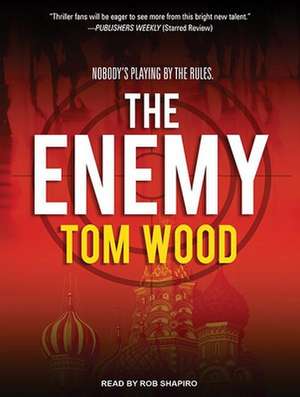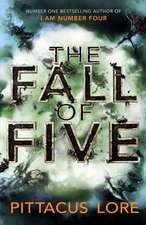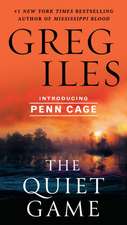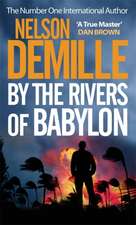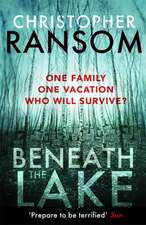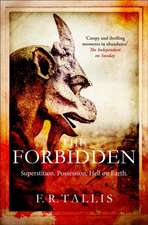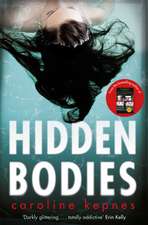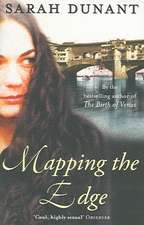The Enemy
Autor Tom Wood Rob Shapiroen Limba Engleză CD-Audio – 11 noi 2013
| Toate formatele și edițiile | Preț | Express |
|---|---|---|
| Paperback (2) | 75.13 lei 3-5 săpt. | |
| Signet Book – 6 mai 2013 | 75.13 lei 3-5 săpt. | |
| Little Brown Book Group – 24 mai 2012 | 102.47 lei 17-23 zile | +8.88 lei 7-13 zile |
Preț: 273.80 lei
Nou
Puncte Express: 411
Preț estimativ în valută:
46.23€ • 48.39$ • 38.25£
46.23€ • 48.39$ • 38.25£
Indisponibil temporar
Doresc să fiu notificat când acest titlu va fi disponibil:
Se trimite...
Preluare comenzi: 021 569.72.76
Specificații
ISBN-13: 9781452617794
ISBN-10: 1452617791
Dimensiuni: 166 x 138 x 27 mm
Greutate: 0.32 kg
Ediția:, CD.
Editura: TANTOR MEDIA INC
ISBN-10: 1452617791
Dimensiuni: 166 x 138 x 27 mm
Greutate: 0.32 kg
Ediția:, CD.
Editura: TANTOR MEDIA INC
Recenzii
INTERNATIONAL PRAISE FOR TOM WOOD
“The scenes are vivid and the plot revelations parceled out at expert intervals...An impressively intricate thriller...Exciting.”—The New Yorker
“Authentically brutal.”—Daily Telegraph
“Jack Reacher meets Thomas Crown in this electrifying thriller.”—Simon Kernick, author of Siege
“A non-stop, breathless, trimmed-to-the-bone thriller with action sequences that are absolutely state of the art. It’s the best chase novel I’ve read in years.”—New York Times bestselling author Joseph Finder
"Wood is a name we’ll rightly hear much more about.”—Daily Mail
“A superlative fiction debut. Non-stop action that veers and twists from one explosive gun battle, betrayal and double cross to the next...Thriller fans will be eager to see more from this bright new talent.”—Publishers Weekly (starred review)
“This book isn’t high-octane, it’s rocket fuel on steroids...”—Crime Squad
“A must for thriller fans.”—Shots Mag
“Crackles like the early work of Robert Ludlum...Wood brings an appealing and enigmatic main character into the mix, creating a refreshing and relentless story line.”—Booklist
“This bang-up thriller is just begging for the big screen.”—Library Journal
“The scenes are vivid and the plot revelations parceled out at expert intervals...An impressively intricate thriller...Exciting.”—The New Yorker
“Authentically brutal.”—Daily Telegraph
“Jack Reacher meets Thomas Crown in this electrifying thriller.”—Simon Kernick, author of Siege
“A non-stop, breathless, trimmed-to-the-bone thriller with action sequences that are absolutely state of the art. It’s the best chase novel I’ve read in years.”—New York Times bestselling author Joseph Finder
"Wood is a name we’ll rightly hear much more about.”—Daily Mail
“A superlative fiction debut. Non-stop action that veers and twists from one explosive gun battle, betrayal and double cross to the next...Thriller fans will be eager to see more from this bright new talent.”—Publishers Weekly (starred review)
“This book isn’t high-octane, it’s rocket fuel on steroids...”—Crime Squad
“A must for thriller fans.”—Shots Mag
“Crackles like the early work of Robert Ludlum...Wood brings an appealing and enigmatic main character into the mix, creating a refreshing and relentless story line.”—Booklist
“This bang-up thriller is just begging for the big screen.”—Library Journal
Notă biografică
Tom Wood was born and raised in Staffordshire, England, and now lives in London.
Extras
• Chapter 1 •
Bucharest, Romania
It was a good morning to kill. Impenetrable gray clouds obscured the sun and the city beneath was dark and quiet. Cold. Just how he liked it. He walked at a relaxed pace, in no hurry, knowing he was making perfect time. A fine rain began to fall. Yes, a particularly good morning to kill.
Ahead of him a refuse truck made its slow way along the road, hazard light flashing orange, windshield wipers swinging back and forth to flick away the drizzle. Refuse collectors followed the vehicle, hands buried under armpits while they waited to reach the next pile of trash bags on the sidewalk. They chatted and joked among themselves.
He interrupted the group’s banter as he passed through the spiraling cloud of exhaust fumes condensing in the spring air. He felt their gaze upon him, taking in his appearance for the few short seconds before he’d gone.
There was little for them to note. He was smartly dressed—a long woolen coat over the top of a dark gray suit, black leather gloves, thick-soled Oxford shoes. In his left hand he carried a metal briefcase. His dark hair was short, his beard neatly trimmed. Despite the cold, only the bottom two of his four overcoat buttons had been fastened. Just a businessman on his way to the office, they would assume. He was a businessman of sorts, but he doubted they would guess the nature of his uncommon profession.
Behind him, a trash can clattered into the road and he looked briefly over his shoulder to see black bags split open and refuse spilling across the asphalt. The garbage-men groaned and rushed to gather up the trash before the wind could spread it too far.
After a short walk, the businessman arrived at a large apartment complex. It stood several stories taller than the surrounding buildings. Balconies and satellite dishes jutted out from the dull brown walls. He made sure not to appear rushed as he took the half-dozen steps up to the front door. He unlocked it with his day-old key and stepped inside.
There were two elevators, but he opted for the stairs, climbing twenty-two flights to the top floor. He reached his destination with little trace of fatigue.
The corridor beyond the stairwell door was long and featureless. Spaced at regular intervals were numbered, spyholed doors. Dirty linoleum lined the floor. The paint on the walls was faded and chipped. The cool air smelled of strong detergent. Somewhere a baby cried softly.
At the end of the corridor, where it intersected with another, was a door marked maintenance. He put his briefcase down, and from a pocket removed a small packet of butter taken from a nearby diner. He unfolded the wrapper and carefully smeared the butter onto the hinges of the door. He placed the empty wrapper back into the same pocket.
From inside his coat, he removed two small metal tools: a tension wrench and a slim, curved pick. The lock was significantly better than most, but the businessman unlocked it in less than sixty seconds.
A door opened behind him.
He slipped the lock picks back into the pocket. Someone said something in gruff-sounding Romanian. The man with the briefcase spoke several languages, but not this one. He stayed facing the door for a moment in case the speaker was talking to someone inside the apartment. A slim chance, but one he had to play nevertheless.
The voice called again. The same guttural words, but louder. Impatient. His back still to the speaker, the businessman reached inside his coat. He withdrew his right hand and kept it out of sight by his hip. He turned side-on, to the left, to look at the resident, keeping his head tilted forward, eyes in the shadow of his brow.
A heavyset man with several days’ worth of stubble was leaning out of his front door, fat fingers white on the frame. A cigarette hung from thick lips. He looked over the man with the briefcase and removed the cigarette from his mouth with a shaking hand. Ash fell from the end and on to the marked linoleum.
He swayed as he spoke again, words slow and slurred. A drunk, then. No threat.
The businessman ignored him, picked up his briefcase and moved down the adjoining corridor, walking away from the drunk before he made any more noise. When a door clicked shut behind him, he stopped and silently retraced his steps, peered around the corner, saw no one and placed the 9 mm Beretta 92F handgun back inside his overcoat. He reset the safety with his thumb.
Total darkness enshrouded the room on the other side of the maintenance door. Water dripped somewhere unseen. The businessman flicked on a slim flashlight. The narrow beam illuminated the room—bare brick walls, pipework, boxes, a metal staircase along one side. He negotiated his way across the space and ascended the stairs. His shoes were quiet on the metal steps. At the top, a padlock secured the rust-streaked roof access door. The lock was marginally harder to pick than the previous one.
Eleven stories up, the icy wind stung his face and every inch of exposed flesh. It subsided within a few seconds as the pressure equalized between the stairwell and roof. He crouched to reduce his profile against the sky and moved across the roof to the west edge. The wind was pushing the clouds northward, letting the glow of the rising sun spread across the city. Bucharest extended out in front of him, slowly awakening. Present location aside, a particularly beautiful city. This was his first visit, and he hoped his work would bring him back before too long.
He turned his attention to his briefcase, unlocked it and opened it flat. Inside, a sheet of thick foam rubber surrounded the disassembled Heckler &Koch MSG-9. He removed the barrel first and attached it to the body of the rifle. Next, he fixed the Hensoldt scope in place, followed by the stock and finally the twenty-round box magazine. He folded down the bipod and rested the weapon on the roof’s low parapet.
Through the scope he saw a 10x magnification of the city—buildings, cars, people. For fun, he positioned the crosshairs over a young woman’s head and, anticipating her movements to keep her reticule in place, tracked her as she sipped her morning coffee. She passed beneath the branches of a tree and he lost her. Lucky girl, he thought with a rare smile. He took his eye from the sight, repositioned the rifle and looked through the scope once more.
This time he saw the entrance to the Grand Plaza Hotel on Dorobantilor Avenue. The eighteen-story building had a modern façade, all glass and stainless steel, appearing both strong and sleek at the same time. The businessman had stayed in several hotels of the Howard Johnson chain while plying his trade around the globe, but not this particular one. If the Grand Plaza met the reasonable to-high standards of the rest of the franchise, he imagined the target would have enjoyed a pleasant stay. He thought it only fitting that the condemned man should get a good night’s sleep before his morning execution.
The man with the rifle took a laser rangefinder from his briefcase and aimed the beam at the hotel entrance, finding it exactly six hundred and four yards away in central Bucharest. Well within acceptable range, and only six yards under his estimate. He rotated the elevation wheel to correct for the distance and elevation.
Outside the hotel entrance, a craggy-faced doorman revealed his bad teeth by yawning. Close to him, tied to a nearby streetlight, a purple ribbon fluttered in the breeze. The man with the rifle watched it for a moment, calculating the wind speed. Five, maybe five-and-a-quarter miles per hour. He adjusted the Hensoldt’s windage wheel, wondering how long it would be before someone realized the significance of the seemingly innocuous ribbon. Maybe no one ever would.
He adjusted the scope’s power ring, decreasing the magnification to see a wider view of the hotel. There were few other people nearby. Some pedestrians, the occasional guest, but no mass of people. This was good. His marksmanship was excellent, but with just seconds to make the kill, he required a clear line of sight. He had no compunction about shooting whoever was unfortunate enough to stand between the bullet and its true mark, but such killings tended to give targets advance warning of their own impending demise, and as long as the target wasn’t mentally deficient, they moved.
The man with the rifle checked his watch. Today’s unfortunate subject was due to appear shortly, if the itinerary included with the dossier was accurate. The businessman had no reason to doubt his client-supplied information.
Another adjustment of the scope and he saw the entire width of the hotel’s front side and two-thirds of the way up its single tower. Light from the rising sun reflected off the windows of the top three floors within the scope’s view.
The rain had ceased by the time a limousine pulled onto the hotel’s drive from the adjoining road and stopped outside the main entrance. A large white guy dressed in a beige overcoat and dark jeans climbed out and ascended the steps with the brisk efficiency of a bodyguard. His head swept back and forth, fast but efficient, gaze registering every nearby person, assessing for threats and finding none.
The man with the rifle felt his heart rate begin to speed up as the time grew rapidly closer. He breathed deeply to stop it climbing too high and negatively affecting his aim. He waited.
After a minute, the bodyguard reappeared and took up position midway down the steps. He looked around before gesturing back up at the entrance. In a few seconds the target would come into view. According to the dossier, the target—a Ukrainian—typically traveled with several bodyguards who would naturally have stayed at the same hotel. The bodyguards were all ex-military or ex-intelligence, who would no doubt surround the Ukrainian and make an otherwise completely clear shot difficult.
The man with the rifle had selected the MSG-9 because it was semi-automatic and would allow him to fire several times inside of just a few seconds. The 7.62 × 51 mm full-metal-jacketed rounds carried enough power to pass through a human body and still kill someone standing behind, and these particular bullets incorporated a tungsten penetrator to account for the body armor the target and his guards would likely wear. A wall of flesh two-armored-men thick could shield the Ukrainian and he would still die.
Before the businessman could zoom in closer to prepare for the shot, a tiny flicker of light from a window of the hotel’s thirteenth floor caught his attention. He quickly raised the barrel of the MSG-9, angling up the scope to check out the light source. He feared a guest was better enjoying the view of the city through a telescope or pair of binoculars. From an elevated position they might inadvertently spot him, and if so, he would have to forget about the contract and make a quick escape. No point completing the kill if the police apprehended him afterward.
Once the reticule centered over the window he increased the magnification of the scope, and saw the source of the flicker was not the reflection of sunlight on the lenses of binoculars or a telescope but a rifle scope like his own.
A suppressed muzzle flash transformed the businessman’s surprise to alarm for the two-thirds of a second it took for the bullet to reach his head.
Pink mist swirled in the air.
Descriere
Descriere de la o altă ediție sau format:
Victor, a former assassin-for-hire, has joined forces with a CIA special unit. His first assignment: Three strangers. Three hits. Fast and clean. Victor's a natural for this. But with each hit Victor is plunged deeper into an unimaginable conspiracy where no one, least of all the people he knows, can be trusted. Available in a tall Premium Edition. Original.
Victor, a former assassin-for-hire, has joined forces with a CIA special unit. His first assignment: Three strangers. Three hits. Fast and clean. Victor's a natural for this. But with each hit Victor is plunged deeper into an unimaginable conspiracy where no one, least of all the people he knows, can be trusted. Available in a tall Premium Edition. Original.
